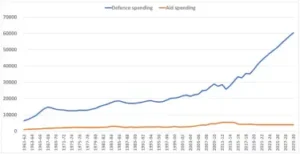
Description: Defence Spending Peace Investment
Dive into Australia’s defence spending vs. peace investment debate. How should resources be allocated for lasting peace? #PeaceOverWar
Introduction: Assessing the Impact of Defence Contracts on Peace Efforts
Australia’s engagement with Rheinmetall for a $1 billion defence contract marks a significant investment in military capabilities, touted to bolster national security and economic stability by creating 1,000 jobs. While these developments promise substantial economic benefits, they also ignite debates about the balance between defence spending and investments in peace-building initiatives. This analysis delves into whether national resources could be better used to foster a stable and peaceful society.
Economic Boom, But at What Cost?
Boosting the Economy with Defence Contracts
The Rheinmetall defence contract is predicted to stimulate Australia’s economy significantly. By creating jobs and invigorating related industries, such as manufacturing and technology, the contract is expected to contribute positively to economic growth. Defence contracts often have a multiplier effect, potentially leading to growth in ancillary sectors including electronics, construction, and logistics, which all play roles in the production and maintenance of defence equipment.
Examining the Trade-offs
However, the economic upswing from defence spending comes with potential trade-offs. The substantial allocation of funds to military purposes might divert resources from vital public sectors such as education, health, and welfare—areas that also significantly contribute to national stability and well-being. This diversion can create a scenario where short-term economic gains are weighed against potential long-term societal needs.
The Massive Peace Deficit
Disparity in Funding

Comparatively, the funding for peace-promoting initiatives like diplomacy, conflict resolution, and social justice is minimal. For instance, while billions are earmarked for defence capabilities, diplomatic and developmental aid programs often struggle with budget constraints that limit their effectiveness and reach. This disparity raises concerns about whether current spending adequately addresses the broader spectrum of national and global security.
Reevaluating Global Priorities
The skewed prioritization towards military expenditure over peacebuilding reflects a broader global trend that often favours immediate reactive measures over long-term preventive strategies. Investing in peace-building—through diplomacy, international cooperation, and development aid—could yield long-term benefits that surpass the temporary security provided by military dominance.
Societal Questions Raised by Defence Investments
The Opportunity Cost of Defence Spending
Each dollar spent on defence contracts is a dollar not spent on social programs that could help prevent conflicts from arising in the first place. Investments in education, poverty alleviation, and social equity could address the root causes of unrest and instability, potentially reducing the need for extensive military expenditures.
Catalysing Broader Discussions
The allocation of vast resources to defence needs a broader public discussion on fiscal priorities. It encourages society to question whether current expenditure aligns with the collective vision for the nation’s future, and whether alternative investments in social capital could lead to a more secure and stable society.
The Power of Public Opinion
Influencing Resource Distribution
Public opinion is a powerful force in shaping governmental policy decisions. A shift in public sentiment towards peace-oriented policies could encourage politicians to reallocate funds accordingly. Active public engagement through voting, advocacy, and participation in policy formulation can steer national agendas towards more balanced spending.
Advocating for Change
To effect change, citizens must voice their preferences for how government budgets are used. Engaging in discussions, supporting non-profit organizations focused on peacebuilding, and advocating for legislative changes are all vital actions that the public can take to influence the allocation of resources towards peace initiatives.
A Call for Balance
Reassessing Resource Allocation
The $1 billion defence contract with Rheinmetall serves as a critical point for reassessment. It offers an opportunity to debate and redefine the balance between spending on defence and investing in peace-building measures that ensure long-term stability and prosperity.
Striving for a Fairer and More Peaceful World
This reassessment should aim to create a fairer allocation of resources that supports a comprehensive approach to national and global challenges—balancing defence needs with proactive investments in the foundations of peace.
Conclusion: A Critical Crossroad for Australia and Beyond
As Australia continues to navigate its strategic priorities, the recent defence spending highlights a pivotal choice between continuing a path of heavy military investment or pivoting towards enhanced support for peacebuilding. This choice will define not only Australia’s role on the international stage but also the quality of life within the nation.
Question for Readers:
“Do you think the resources allocated for defence could be better used in peace-building initiatives?”
Call to Action:
“Voice your opinion on the balance between defence spending and peace investments. Let us start a dialogue for a more peaceful future. Share your thoughts!”
References:
https://www.pm.gov.au/…/1-billion-defence-agreement…
https://www.rheinmetall.com/…/rheinmetall-man-military…
